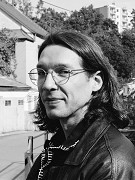

|
Sun2 Apr11:00am(15 mins)
|
Where:
Main Building Room 132
Presenter:
|

There is a tendency to think of security of queer people (in Eastern Europe and elsewhere) as a matter of physical safety. While this narrow focus may be warranted in some cases, it becomes problematic and risks essentialising victimisation when it fails to recognise that security means different things to different people and (physical) violence is not always the prime concern. What do we learn if instead of focusing on violence, we treat the meaning of security as an open question and queer people as agents rather than passive victims? That is the guiding principle of the ethnographic research that I have been conducting in Georgia since 2019. Using semi-structured interviews and participant observation as my data collection methods, I have identified several "registers" of security. Unsurprisingly, the understanding of security as physical safety features among them, but some other registers revolve around being one's "real self" or feelings of belonging. In my presentation, I will describe how various versions of security are performed and, importantly, how they relate to each other. Indeed, while these registers may resemble Maslow's hierarchy in some respects, they do not always build upon one another and sometimes even clash: "I'd like to get beaten up," one interlocutor told me, hoping to secure their membership of the queer community. The study hopes to deepen our understanding of the needs of queer people in Georgia and potentially elsewhere.